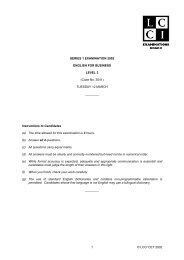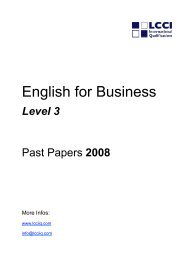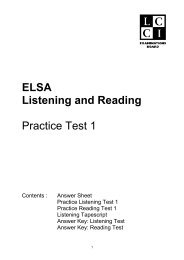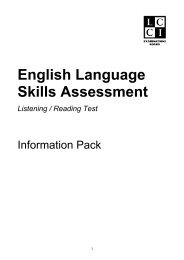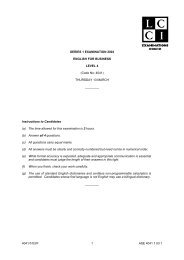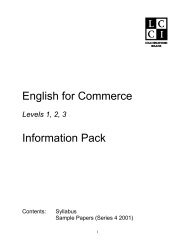English For Business Level 3 Infopack - LCCI
English For Business Level 3 Infopack - LCCI
English For Business Level 3 Infopack - LCCI
You also want an ePaper? Increase the reach of your titles
YUMPU automatically turns print PDFs into web optimized ePapers that Google loves.
Question 3 continued<br />
Sample Examination<br />
It need not be a totally different product. If your customer shows interest in a basic standard product, why not<br />
offer the more modern sophisticated version?<br />
Of course, we should not confuse this with selling your customers a totally different product. If in your café<br />
experience, you had been asked “Would you like a television, a car or a pair of trousers?”, you would have<br />
found this very strange and almost certainly refused.<br />
Basically you should keep in mind that every time someone makes a purchase from your organisation you have<br />
the opportunity to increase the size of the purchase. Your aim is to secure the optimum benefit of the purchase<br />
for both yourself and your customer.<br />
In fact, this is more than an aim; it is your responsibility to introduce your customer to all the alternatives they<br />
have when making a purchase. In most cases they will not have recognised these as alternatives and will be<br />
pleased to cooperate. Always keep in the front of your mind that if your customers do not make these<br />
purchases from you, where will they go to do this? To another company, of course. So by accepting the policy<br />
of “add-ons” you are increasing your own company’s business and depriving your rivals of custom. Isn’t that a<br />
splendid idea?<br />
Thank you.<br />
Task<br />
Using the information answer in your own words as far as possible the questions that follow.<br />
a. Describe what is meant by the term “add-on”. (3 marks)<br />
b. What does Mr Cheeseman mean when he describes sales as “the lifeblood of a business”?<br />
(3 marks)<br />
c. Why is it likely that your customer will be grateful for receiving an “add-on” product? (2 marks)<br />
d. What might happen if you attempt to sell an “add-on” product to a customer who genuinely only requires<br />
one basic product? (3 marks)<br />
e. Why does an add-on product not have to be a totally different product to that requested by a customer?<br />
(2 marks)<br />
f. What is likely to happen if you attempt to sell a totally unconnected product as an “add-on”?<br />
(2 marks)<br />
g. What is meant by the sentence “Your aim is to secure the optimum benefit of the purchase for both<br />
yourself and the customer”? (sixth paragraph) (4 marks)<br />
h In the last paragraph, what does Mr Cheeseman suggest the customer is likely to do if you miss the<br />
opportunity to sell an “add-on” product? (2 marks)<br />
i. Give an example from your own experience of a product that could be sold as an “add-on” to another<br />
product, giving reasons for your answer. (4 marks)<br />
9<br />
(Total 25 marks)





